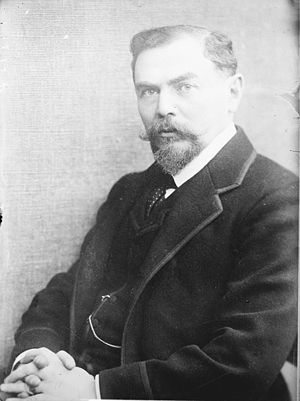Edmund Schultze
Edmund Ritter von Schultze | |
|---|---|
 Photograph in 1853 | |
| Born | July 25, 1820 |
| Died | April 14, 1888 (aged 67) |
| Nationality | Cislanian (1820-1842) Weranian (1842-1888) |
| Alma mater | Wiesstadt University |
| Scientific career | |
| Fields | |
| Institutions | |
Edmund Ritter von Schultze (July 25, 1820 - April 14, 1888, aged 67) was a Weranian biologist, microbiologist and chemist most famous for his pioneering work in the fields of microbial fermentation and Schultzeisation. Alongside Alessandro de Vecchi Schultze also gained fame for his research into vaccinations helping develop one for anthrax and doing significant research into ones for rabies before his sudden death in 1888.
Schultze became most known for his work surrounding the germ theory of disease, where he through sterilised environments proved that liquids such as beer and milk after a period of time noted a buildup of microorganisms that could be eliminated through heat. Schultze later developed the theory to also apply to solid matter and eventually the human body where he argued that it was a buildup of germs that caused disease. Later presenting his findings to the Weranic Imperial Institute of Science Schultze demonstrated that in sterilised, closed environments germs could not develop but this was not the case when opened. This furthered his reputation as the "father of microbiology" and he became prominently associated with the idea of germ theory.
Moving to Etruria Schutlze later worked on vaccinations with scientist Alessandro de Vecchi, who had also been a proponent of germ theory - by chance the pair discovered that germs which had been weakened by long exposure to the air caused immunity to cholera in chickens. The two men were credited for creating a vaccination for anthrax and later worked on a vaccination for rabies before Schutlze died of a heart attack in 1888.
Schutlze has been credited for significant contributions to germ theory and for understanding the structure of organic compounds. His heavy drinking and aversion to publicity led his partner de Vecchi to take significant credit for his work on vaccinations with scientific historians divided on the two men's contributions to the field of study.